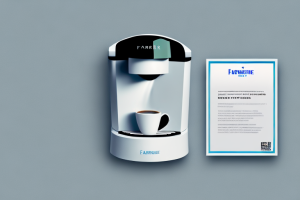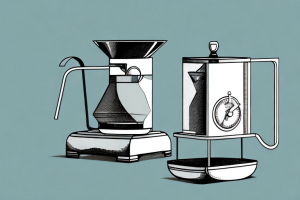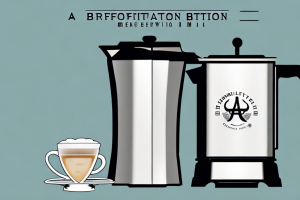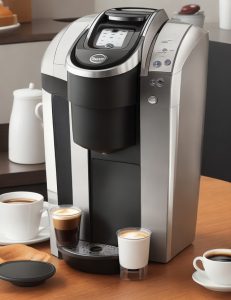How Much Coffee For 12 Cups Coffee Maker

A 12-cup coffee maker with a measuring cup of coffee beans beside it
If you are a coffee lover and you own a 12-cup coffee maker, then you must know how crucial it is to measure the perfect amount of coffee for optimal flavor and strength. With this guide, you’ll learn all about the factors that affect the quantity of coffee you need for your 12-cup brewer, how to calculate the perfect amount of coffee, how to adjust the coffee to water ratio, and much more.
Understanding the 12-cup Coffee Maker
Before diving into the details of measuring coffee, you need to be familiar with your 12-cup coffee maker. The 12-cup coffee maker is a standard-size coffee maker that brews a maximum of 12 cups of coffee at a time. It usually requires a paper filter that is placed in a basket, and water is added to a water tank that heats the water to the required temperature for extraction.
Additionally, some 12-cup coffee makers come with programmable features that allow you to set a specific time for the coffee maker to start brewing. This is a convenient feature for those who want to wake up to a fresh pot of coffee in the morning. It is important to read the instructions carefully to ensure that you are using the programmable feature correctly and safely.
The Importance of Measuring Coffee for Your Coffee Maker
Measuring coffee is crucial for achieving the perfect flavor and strength. If you use too much coffee, the coffee will be too strong, and if you use too little, the coffee will be too weak. The right amount of coffee will depend on various factors.
One of the most important factors to consider when measuring coffee is the type of coffee maker you are using. Different coffee makers require different amounts of coffee to achieve the desired strength and flavor. For example, a French press typically requires a coarser grind and a higher coffee-to-water ratio than a drip coffee maker. It’s important to read the instructions for your specific coffee maker and adjust your measurements accordingly.
Factors Affecting the Amount of Coffee Needed for 12 Cups
The amount of coffee you need for 12 cups will depend on various factors, such as the type of coffee beans, roast profile, grind size, and water temperature. In general, darker roast coffee has a stronger flavor, while lighter roast coffee has a milder taste. Also, the finer the grind size, the stronger the coffee will be, and vice versa.
Another factor that can affect the amount of coffee needed for 12 cups is the altitude at which the coffee is brewed. At higher altitudes, the boiling point of water is lower, which can result in under-extracted coffee. This means that you may need to use more coffee to achieve the desired strength of the brew.
Additionally, the freshness of the coffee beans can also impact the amount needed. As coffee beans age, they lose their flavor and aroma, which can result in a weaker brew. Therefore, if you are using older beans, you may need to use more to achieve the desired taste.
How to Calculate the Perfect Amount of Coffee for Your 12-cup Brewer
To calculate the right amount of coffee for your 12-cup coffee maker, you need to use a coffee to water ratio. A standard ratio is using one to two tablespoons of coffee per six ounces of water. Therefore, for 12 cups of water, you will need about 24 tablespoons of coffee, which is equivalent to 1.5 cups of ground coffee.
However, it’s important to note that the strength of coffee is subjective and can vary based on personal preference. If you prefer a stronger cup of coffee, you can increase the amount of coffee used in the ratio. On the other hand, if you prefer a milder cup of coffee, you can decrease the amount of coffee used.
Additionally, the quality of the coffee beans and the freshness of the coffee can also affect the taste of the final product. It’s recommended to use freshly roasted coffee beans and grind them just before brewing for the best flavor. Experimenting with different types of coffee beans and roasts can also help you find the perfect cup of coffee for your taste buds.
Tips for Adjusting the Coffee Grounds to Water Ratio to Achieve Perfect Flavor
If you prefer your coffee stronger or weaker, you can adjust the coffee to water ratio according to your preference. You can use a coffee scale to measure the coffee accurately, or you can use a scoop that comes with your coffee grinder or coffee maker.
One important factor to consider when adjusting the coffee grounds to water ratio is the type of coffee beans you are using. Different types of beans have different levels of acidity and bitterness, which can affect the taste of your coffee. For example, if you are using a dark roast coffee, you may need to use less coffee grounds to achieve the desired strength, as dark roasts tend to have a stronger flavor.
Another tip for adjusting the coffee to water ratio is to experiment with different brewing methods. For example, if you are using a French press, you may need to use a coarser grind of coffee to achieve the desired strength, as the water is in contact with the coffee for a longer period of time. On the other hand, if you are using a drip coffee maker, you may need to use a finer grind of coffee to achieve the desired strength, as the water passes through the coffee quickly.
The Different Types of Coffee Beans and Their Impact on Brew Strength
The type of coffee beans you use also affects the strength of the coffee. For example, Robusta beans have a higher caffeine content than Arabica beans, which means that coffee made from Robusta beans will be stronger and contain more caffeine.
In addition to Robusta and Arabica beans, there are other types of coffee beans that can impact the strength of your brew. For instance, Liberica beans have a unique flavor profile that is often described as smoky and floral. However, they are not as widely available as Robusta and Arabica beans. Another type of coffee bean is the Excelsa bean, which has a tart and fruity flavor. When combined with other beans, Excelsa can add complexity to the flavor of your coffee.
Ground vs Whole Bean: Which is Best for Your 12-cup Coffee Maker?
Whether to use ground or whole bean coffee is a matter of personal preference. However, using whole bean coffee will give you a fresher and tastier cup of coffee; therefore, it’s worth investing in a good coffee grinder to grind your beans before brewing. Using pre-ground coffee means that the coffee will be less fresh over time and may lose some of its flavors and aroma.
Another advantage of using whole bean coffee is that you have more control over the grind size, which can affect the taste of your coffee. For example, a coarser grind is better for French press coffee, while a finer grind is ideal for espresso. By grinding your own beans, you can experiment with different grind sizes to find the perfect one for your preferred brewing method.
Choosing the Right Grind Size for Your 12-cup Brewer
The grind size that you choose also plays a vital role in achieving the perfect cup of coffee. A finer grind size will allow more surface area for the water to extract flavor, resulting in a stronger coffee, while a coarser grind size will produce a milder coffee.
It’s important to note that different types of coffee beans may require different grind sizes. For example, a darker roast may require a coarser grind size to prevent over-extraction and bitterness, while a lighter roast may require a finer grind size to fully extract its delicate flavors. Experiment with different grind sizes to find the perfect balance for your preferred coffee beans and brewing method.
Experimenting with Different Roasts and Blends to Find Your Perfect Cup
There is no one-size-fits-all when it comes to coffee. It’s recommended that you experiment with different roast profiles and blends until you find the perfect cup of coffee that suits your taste.
Some popular roast profiles include light, medium, and dark. Light roasts are known for their bright and acidic flavors, while dark roasts are known for their bold and smoky flavors. Medium roasts fall somewhere in between, offering a balance of acidity and richness. Additionally, blends can offer a unique flavor profile by combining different types of beans from various regions. Some blends may be more fruity or floral, while others may be more chocolatey or nutty. Don’t be afraid to try something new and step out of your comfort zone to discover your perfect cup of coffee.
How to Store Your Coffee Beans or Grounds Properly for Optimal Freshness and Flavor
To ensure optimal freshness and flavor, store your coffee beans or grounds in a cool, dry, and dark place away from moisture, heat, and light. You can also use a vacuum-sealed container or coffee canister to maintain freshness.
It’s important to note that coffee beans or grounds should never be stored in the fridge or freezer, as the moisture and temperature fluctuations can negatively affect the flavor and aroma. Additionally, it’s best to only buy the amount of coffee you can consume within a week or two to ensure maximum freshness.
Troubleshooting Common Issues with Over or Under-Brewed Coffee in a 12-cup Maker
If you’re experiencing issues with your coffee, such as over-extraction or under-extraction, there are a few things you can do to troubleshoot. You can adjust the grind size, coffee to water ratio, water temperature, or try using a different type of coffee beans to achieve your desired taste and strength.
By following the tips and guidelines outlined above, you’ll be able to make the perfect cup of coffee with your 12-cup coffee maker.
Another factor that can affect the taste of your coffee is the cleanliness of your coffee maker. Over time, mineral buildup and coffee oils can accumulate in your machine, leading to a bitter taste. To prevent this, it’s important to regularly clean your coffee maker with a mixture of water and vinegar or a specialized cleaning solution.
Additionally, the freshness of your coffee beans can also impact the taste of your coffee. Coffee beans start to lose their flavor and aroma shortly after they are roasted, so it’s best to use beans that have been roasted within the past two weeks. You can also store your beans in an airtight container in a cool, dark place to help preserve their freshness.



